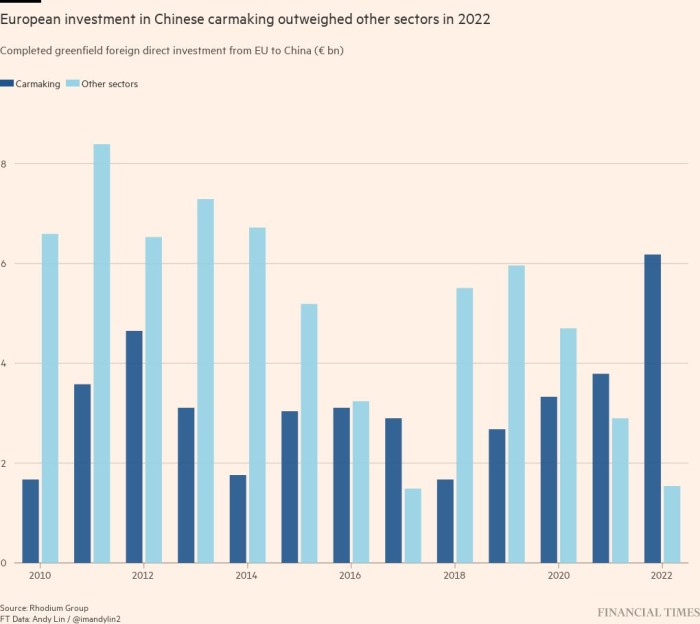What the EU learned from panic-buying Covid vaccines
This article is an on-site version of our Europe Express newsletter. Sign up here to get the newsletter sent straight to your inbox every weekday and Saturday morning
Good morning. It’s a big day for the EU defence sector. Member state ambassadors will try (again) to find a deal on how to spend €1bn on procuring artillery shells for Ukraine, with France and Germany divided over how non-EU companies can contribute.

European investment into the Chinese car sector surged to a record high of €6.2bn last year, more than three times investment in other sectors, as European carmakers warn that cutting ties would be “unthinkable”.
Competing views
An American economist with ties to Big Tech is poised for a top job in Brussels. But not everyone is happy with that prospect, writes Javier Espinoza.
Context: One of the most influential positions in the EU single market is the chief competition economist, who has the ear of the European Commission on all matters of economic policy and can potentially block mammoth mergers.
Fiona Scott Morton is a lead candidate for the role, according to multiple people with direct knowledge of the matter. The Yale professor was a top figure during the Obama administration.
But civil society groups, including the Open Markets Institute, an anti-monopoly coalition, have written to Margrethe Vestager, the EU’s executive vice-president in charge of competition, with a number of concerns.
One of them is that Scott Morton did consulting work for corporations such as Apple and Amazon. The “proximity to Big Tech firms will hamper her ability to enforce the EU’s competition laws neutrally and effectively against them,” the groups write in their letter.
They also noted that not being an EU citizen could raise questions over Scott Morton’s selection process and wondered why another EU candidate without conflicts of interest was not selected.
The letter also takes issue with how she sees competition, notably her support of “maximising the output and sales to consumers at the lowest prices possible, ignoring other actors and issues affected by concentrated economic power, including workers, small businesses, the environment, democracy and the wider public interest.”
A person close to Scott Morton defended her record by saying the consulting work she has done for Big Tech ended two years ago and there may not be conflicts of interest.
Scott Morton and the commission declined to comment.
What to watch today
EU commission presents proposals on anti-corruption initiatives and ammunition production.
EU employment and social affairs ministers in Stockholm for an informal meeting.
Now read these
Red-handed: A network run by Russia’s FSB spy agency bought sensitive technology from Europe despite sanctions, an FT investigation has found.
End of spring: An in-depth analysis into Tunisia’s return to autocracy, which has European countries increasingly worried.
Acting on AI: The EU has been fastest on AI regulation, but policymakers don’t know enough about the technology, writes Marietje Schaake.
Recommended newsletters for you
Britain after Brexit — Keep up to date with the latest developments as the UK economy adjusts to life outside the EU. Sign up here
Trade Secrets — A must-read on the changing face of international trade and globalisation. Sign up here
Are you enjoying Europe Express? Sign up here to have it delivered straight to your inbox every workday at 7am CET and on Saturdays at noon CET. Do tell us what you think, we love to hear from you: [email protected]. Keep up with the latest European stories @FT Europe
This story originally appeared on: Financial Times - Author:Javier Espinoza



























